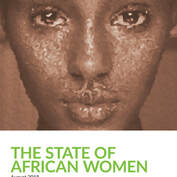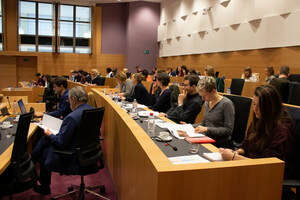 C RightByHer
C RightByHer On Thursday the 28th of February in Brussels, the ‘The State of African Women’ report was presented on the eve of International Women’s Day at the federal parliament. Gina Wharton, policy advisory at IPPF European Network presented the research report by the Dutch KIT Royal Tropical Institute, a report that is part of an awareness project that goes by the title ‘Right by Her’. The research report maps the realisations as well as the gaps in the ratification and implementation of the Maputo Protocol by African states. This protocol is a legally binding instrument in which the rights of African women have been recognised by the member states of the African Union.
 Copyright de Kamer
Copyright de Kamer Maputo more advanced than the 2030 Agenda
The Maputo Protocol prohibits discrimination of women, female genital mutilation, protects women from violence in the public and private sphere, protects adolescents against abuse and sexual harassment, prohibits forced and early marriages, recognises reproductive rights and the right to health , including sexual and reproductive health, and pays particular attention to vulnerable groups such as adolescents, widows and women with disabilities, it also recognises abortion as a human right under specific conditions (see below). The protocol is key for the realisation of the Sustainable Development Goals (SDGs) and is, at the same time, more progressive in some regards than the 2030 Agenda. What is more, the protocol binds the signatory states to legal obligations, contrary to the non-committal character of the SDGs.
Why is implementation lagging behind?
All Belgian partner countries are signatories to the Maputo Protocol, except for Morocco (which had not joined the African Union at the time of its adoption in 2003). All partner countries have also ratified the text, except for Burundi and Niger. The overall number of countries effectively reporting on their progress in implementation is limited though. Most countries in Africa face a lack of financial and human resources to translate the protocol into action. The numbers relate to the relevance of the protocol though: 1 in 3 women experiences violence throughout her lifetime, more than 1 in 5 women in Africa has no access to family planning, and 1 in 4 girls gets pregnant before the age of 18.
Right to abortion on the continent
Every year an estimated 8.2 million unsafe abortions take place in Africa. 3 in 4 of these are unsafe. The number of unplanned pregnancies is particularly high amongst adolescent girls in Africa, and consequently the number of unsafe abortions in this age group is much higher than world averages. The Maputo Protocol allows abortion when the life of the mother is in danger, if the pregnancy is a threat to the mother’s mental and/or physical health, in case of foetal malformations and if the pregnancy is the result of sexual violence, rape or incest. The extent to which abortion is legal is very different from state to state though. In DR Congo, Senegal, Mauritania, Congo-Brazaville and Egypt, abortion is prohibited under any circumstance. In other countries it is only allowed when the mother’s life is in danger, or when the pregnancy threatens the mother’s health. Only 7 African states allow abortion as specified in the Maputo Protocol. This is the case for Mozambique, South Africa, Tunisia, Ghana, Ethiopia, Rwanda and the Seychelles.
No partner country is doing well across the board
Where some partner countries have made progress in the uptake of violence against women or the legalisation of abortion, they run behind in the uptake of child marriages and female genital mutilation. No single partner country of the Belgian development cooperation performs well across the board when it comes to realising and protecting women’s rights.
Parliamentarians promise to engage
MP Jean-Jacques Flahaux, vice chair of the Committee for Societal Emancipation of the Chamber of People’s Representatives and member of the Parliamentarians for the 2030 Agenda promised, as parliamentarian, to ensure that gender and the rights of women and sexual and reproductive health and rights in particular are given priority in the new policy agreement that will follow the federal elections of May 26th. Belgium can also support institutional capacity building, as well as women’s rights organisations which are dedicated to improving the status of women in Africa, and try to push their governments into action. Flahaux concluded: “As parliamentarians we can ask critical questions about the policy and urge our government to not only be alert but also proactive and advance the importance of gender equality and equal rights in practice.”
The seminar was a joint initiative of the Committee for Societal Emancipation of the Chamber of People’s Representatives and the ‘Parliamentarians for the 2030 Agenda’, the parliamentary group that seeks to ensure that Belgium fulfils its promises in realising the 2030 Agenda and the ICPD Cairo Program of Action on Population and Development, which celebrates its 25th anniversary this year.
The report of ‘the State of African Women’ is available in English and is to appear in French and Portuguese soon.
The Maputo Protocol prohibits discrimination of women, female genital mutilation, protects women from violence in the public and private sphere, protects adolescents against abuse and sexual harassment, prohibits forced and early marriages, recognises reproductive rights and the right to health , including sexual and reproductive health, and pays particular attention to vulnerable groups such as adolescents, widows and women with disabilities, it also recognises abortion as a human right under specific conditions (see below). The protocol is key for the realisation of the Sustainable Development Goals (SDGs) and is, at the same time, more progressive in some regards than the 2030 Agenda. What is more, the protocol binds the signatory states to legal obligations, contrary to the non-committal character of the SDGs.
Why is implementation lagging behind?
All Belgian partner countries are signatories to the Maputo Protocol, except for Morocco (which had not joined the African Union at the time of its adoption in 2003). All partner countries have also ratified the text, except for Burundi and Niger. The overall number of countries effectively reporting on their progress in implementation is limited though. Most countries in Africa face a lack of financial and human resources to translate the protocol into action. The numbers relate to the relevance of the protocol though: 1 in 3 women experiences violence throughout her lifetime, more than 1 in 5 women in Africa has no access to family planning, and 1 in 4 girls gets pregnant before the age of 18.
Right to abortion on the continent
Every year an estimated 8.2 million unsafe abortions take place in Africa. 3 in 4 of these are unsafe. The number of unplanned pregnancies is particularly high amongst adolescent girls in Africa, and consequently the number of unsafe abortions in this age group is much higher than world averages. The Maputo Protocol allows abortion when the life of the mother is in danger, if the pregnancy is a threat to the mother’s mental and/or physical health, in case of foetal malformations and if the pregnancy is the result of sexual violence, rape or incest. The extent to which abortion is legal is very different from state to state though. In DR Congo, Senegal, Mauritania, Congo-Brazaville and Egypt, abortion is prohibited under any circumstance. In other countries it is only allowed when the mother’s life is in danger, or when the pregnancy threatens the mother’s health. Only 7 African states allow abortion as specified in the Maputo Protocol. This is the case for Mozambique, South Africa, Tunisia, Ghana, Ethiopia, Rwanda and the Seychelles.
No partner country is doing well across the board
Where some partner countries have made progress in the uptake of violence against women or the legalisation of abortion, they run behind in the uptake of child marriages and female genital mutilation. No single partner country of the Belgian development cooperation performs well across the board when it comes to realising and protecting women’s rights.
Parliamentarians promise to engage
MP Jean-Jacques Flahaux, vice chair of the Committee for Societal Emancipation of the Chamber of People’s Representatives and member of the Parliamentarians for the 2030 Agenda promised, as parliamentarian, to ensure that gender and the rights of women and sexual and reproductive health and rights in particular are given priority in the new policy agreement that will follow the federal elections of May 26th. Belgium can also support institutional capacity building, as well as women’s rights organisations which are dedicated to improving the status of women in Africa, and try to push their governments into action. Flahaux concluded: “As parliamentarians we can ask critical questions about the policy and urge our government to not only be alert but also proactive and advance the importance of gender equality and equal rights in practice.”
The seminar was a joint initiative of the Committee for Societal Emancipation of the Chamber of People’s Representatives and the ‘Parliamentarians for the 2030 Agenda’, the parliamentary group that seeks to ensure that Belgium fulfils its promises in realising the 2030 Agenda and the ICPD Cairo Program of Action on Population and Development, which celebrates its 25th anniversary this year.
The report of ‘the State of African Women’ is available in English and is to appear in French and Portuguese soon.

 RSS Feed
RSS Feed